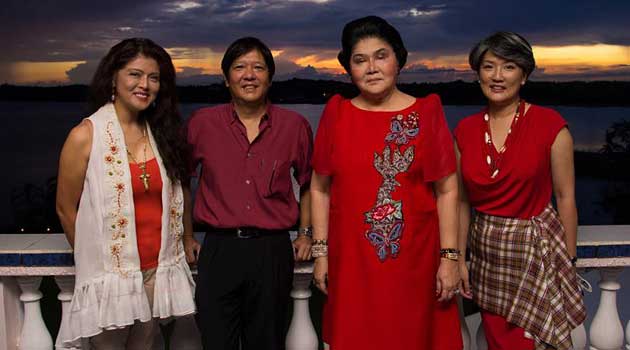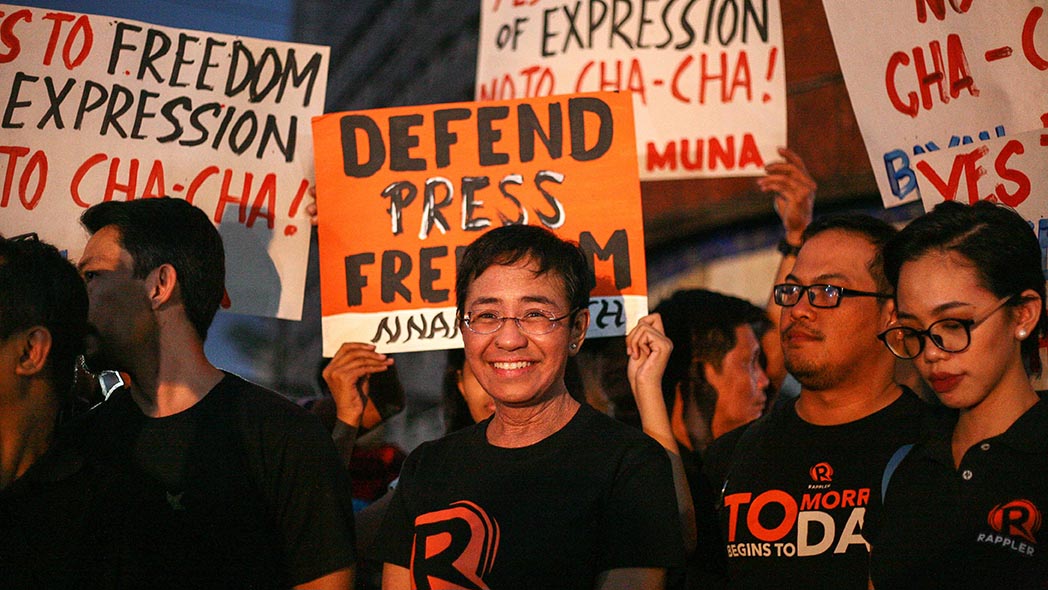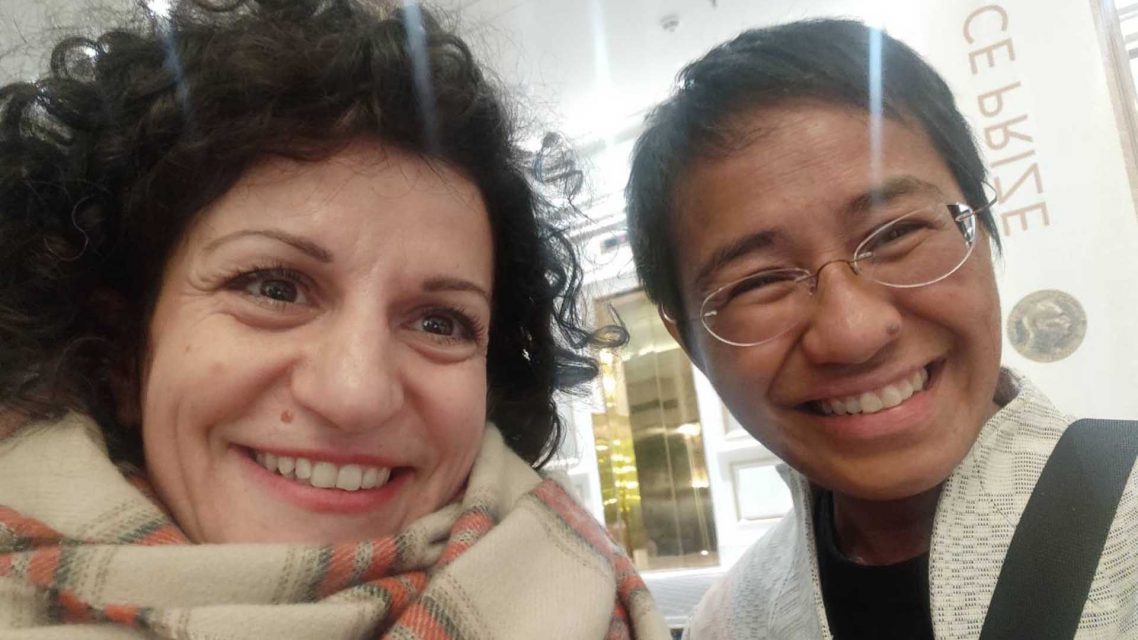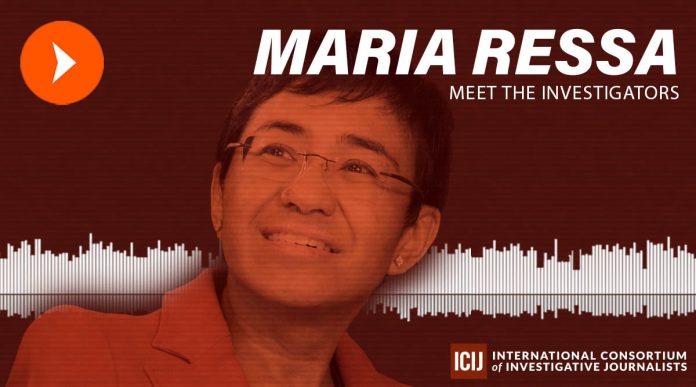In this month’s Meet the Investigators podcast, Nobel Peace Prize-winning reporter and press freedom advocate Maria Ressa speaks about her career, about journalism and democracy, and about having courage in the face of constant intimidation.
In this month’s Meet the Investigators podcast, Nobel Peace Prize-winning reporter and press freedom advocate Maria Ressa speaks about her career, about journalism and democracy, and about having courage in the face of constant intimidation.
The International Consortium of Investigative Journalists collaborates with hundreds of members across the world. Each of these journalists is among the best in his or her country and many have won national and global awards. Our monthly series, Meet the Investigators, highlights the work of these tireless journalists.
Ahead of Press Freedom Day we spoke with Maria Ressa, the Filipino journalist who received the Nobel Peace Prize in 2021 alongside Russian journalist Dmitry Muratov.
Ressa is a co-founder and CEO of Rappler, an online news site in the Philippines, and a former CNN correspondent. In recent years, Ressa and Rappler have become the targets of numerous legal actions and threats from the Philippines’ President Rodrigo Duterte and his administration. She has maintained her innocence and continues to fight back.
Maria’s new book “How to Stand Up to a Dictator: The Fight for Our Future” is scheduled to be published in the fall of 2022.
This interview was recorded prior to the federal election in the Philippines, which was won by Ferdinand Marcos Jr.
ICIJ’s award-winning Meet the Investigators series is emailed exclusively to ICIJ’s Insiders each month before being published on ICIJ.org, and is one of a number of ways we like to thank our community of supporters who are so integral to our independent journalism. You can join our Insiders community by making a donation to ICIJ. Thanks to all our ICIJ Members who have shared their stories with us, and to all our supporters for helping ICIJ continue its work.
TRANSCRIPT:
Scilla Alecci: Hi everyone! Welcome to Meet the Investigators, a podcast by the International Consortium of Investigative Journalists.
I’m your host, Scilla Alecci. Ahead of Press Freedom Day we spoke with a journalist and ICIJ member who won the Nobel Peace prize last year.
Maria Ressa: I’m Maria Ressa, I am one of the co-founders of Rappler, in the Philippines.
Scilla: Maria is a Filipino journalist who grew up in the United States where her family moved in 1973 after then President Ferdinand Marcos declared martial law.
After more than a decade away from home, in 1986 she decided to go back to Manila and work as a producer, and then reporter, for CNN. In the following years, Maria opened CNN’s Manila bureau and the Jakarta bureau, covering everything from natural disasters to terror attacks in South Asia.
Maria: What motivated me during that time period was, frankly, learning. Learning, learning, learning. Learning the craft, going country to country. Learning to manage a bureau, learning to understand politician systems, learning to understand cultures.
And then, over time, it was not just learning that I began to realize that information is power, and that it is necessary to demand justice.
Now, in today’s context, with technology taking over the role of gatekeeper, the role of journalism goes back to its real basic assumption of journalism, which is that you’re not gonna lie and that the facts are not debatable.
This is a battle for facts. If we win the battle for facts, we then can do the rest of the part of being a journalist, but facts are the anchor of a shared reality.
Scilla: After spending many years overseas, in 2004, Maria went back to the Philippines where she headed the news division of one of the country’s largest broadcasting companies, ABS-CBN.
Maria: I wanted to go back and figure out what the future would be like, of news.
So I went from being a reporter handling a small bureau to handling a thousand journalists, handling our regional network group as well as the six overseas bureaus we had. I learned a ton being a news manager.
And I realized that the largest organizations were getting caught flatfooted, because here comes this Internet. And in ABS-CBN and most of the large organizations, you don’t put your best people on the Internet. You put your best people on your primetime news because that’s where the revenues come in, and you put your younger people and maybe your third string on the Internet at that point in time, right? And then I realized: ‘Oh my God, this is going to fundamentally change what we do!’
Scilla: That’s when Maria and three of her colleagues decided to set up their own news organization: Rappler.
Maria: We were like, ‘Oh well, we’ll try it. If it works well for a year, if it doesn’t work, then we’ll go back to what we were doing and if it does work…’
Who knew, right? We’ve kept it at about 100 people. It’s a very dynamic, creative destruction moment and I wanted to stay agile.
There’s three pillars of Rappler: Technology, Journalism, and Community. And it’s funny, you know, I am a journalist and, yet, I place technology as number one, because I think that’s the biggest game changer. The journalism, the standards and ethics and the mission doesn’t change.
And then, the last part is communities. So, when we raised the seed funds for Rappler the elevator pitch was: ‘We build communities of action. And the food we feed our communities is journalism.’
Building communities was built into the way we think about journalism. You need to know what your community needs. You’re not just putting stories in the black hole.
The technology today, what we’re doing is building our own tech. We started actually a decade ago; we built our platform, but I learned so much in the process.
In the end, the goal of journalism is not academic — the goal of journalism is to make the world better.
That technology is what will enable journalism because the tech will not only give you your platform, but it will also determine your distribution. And I think that’s the biggest shift.
In the end, the goal of journalism is not academic — the goal of journalism is to make the world better, right? And that’s kind of fun to be able to say at my advanced age, that is still the goal.
Scilla: And it’s interesting that technology ー which you say it’s one of the fundamental pillars of your organization ー is also one of your beats. Your organization has been one of the first, actually, deciding to cover tech from a different point of view, to understand the power they have in society and the impact they have on people. How did that happen? How did you decide to investigate tech companies?
Maria: In my last year with CNN, the last decade or so I was working on terrorism. So post 9/11 my home base was the world’s largest Muslim population is Indonesia.
And so I was looking at how the virulent ideology, how it could spread, and I used social network analysis to do that. How it’d radicalize, how does it go, how do you build this?
And when we started at the tail end of that, I was beginning to see that social media was being used this way, could be used. And so the idea for Rappler was deeply connected to what we saw that was being used for evil.
For example, on YouTube in 2011, we saw a Filipino speaking Arabic asking jihadists from around the world to come to the Philippines for jihad. And I did the story on him, but then I thought: ‘if you can spread this through social media, well, why could we not use social media for good?’
The idea is to look at information cascades as a way to see how society moves. That was the idea for the mood meter for example.
Scilla: Before Facebook introduced its emojis, Rappler’s site already had what they called a “mood meter.” After reading an article a reader could click on a happy or sad face based on the emotions triggered by the story.
Maria: The idea for the mood meter is to be able to see how a news piece travels through our society in moods. So we had that data and that was kind of fascinating.
It was a hop, skip and a jump to then study this shift in 2016, because it was a radical shift for us. When we began to see candidates — it was then Duterte — and their supporters begin to use anger and hate.
That was rare in the Philippines because the top mood in the Philippines is not anger. It’s ‘happy.’ Filipinos are happy. They click ‘happy.’
So, in 2016, that changed. It became anger, and that was when we began to see something is off, something is happening, something is being changed.
And then we began to map it.
And so, in 2016, when we saw anger and hate being whipped up by politicians, by government officials, who would normally want to be uniting society, we began to map information cascades.
And then we began to look at networks of disinformation, networks that spread lies. And then slowly we could track behavior over time of these networks of disinformation.
And if we can do this, obviously, Facebook can do this, Twitter can do this, YouTube can do this. Why are they being allowed to do it?
Scilla: Rappler’s investigation into social media and disinformation in the Philippines in 2016 was important to understand what led to the election of autocratic President Rodrigo Duterte.
Maria: Because it led us to where we are today, to show how we are being insidiously manipulated by power to maintain power and how it has weakened democracy.
It’s also led me to see that the inherent design of the social media platforms kill facts, actually spread the lies faster, and farther than facts, encouraged the worst of human behavior, has turned them into behavior modification systems.
And it is part of the reason democracy is weaker all around the world and, I would even say, is dying all around the world.
You look at Ukraine today and the lies that [President Vladimir] Putin, that the Russian media has used to justify the invasion of Ukraine — we saw this in 2014, the same bottom up attacks from fake accounts, and then the same things coming from, it was then the foreign minister of Russia at the UN. And nothing was done.
So now, with this happening, I think this is a pivotal moment globally. It will determine a look at the actions of nations, the actions of companies, the actions of social media.
This is a tipping point, I think.
Scilla: Duterte’s six-year term as president allowed by the constitution is over. And this month Filipinos are called to vote for the next president.
Maria: Right now the frontrunner in our presidential elections is Ferdinand Marcos Junior, the son of the dictator, who was ousted 36 years ago in a People Power Revolt that inspired people power movements all around the world.
[Editor’s note: Ferdinand Marcos Junior won the May 9 election, and will become the Philippines’ next president.]
Rappler has actually exposed Marcos’ disinformation network since 2019. In September 2020, Facebook took down information operations coming from China that were polishing the image of the Marcoses.
It is insidious manipulation and this is part of the reason it’s so hard to know what is fact and fiction. And if you don’t know, you cannot mobilize society.
In 2016, we were the first domino to fall with the election of Duterte. And then a little more than a month later, it was Brexit. And then you had Catalonia, you had down to like the U.S. presidential elections that brought [Donald] Trump in.
Scilla: For those of you who are familiar with the Philippines’s recent history the name Marcos will ring a bell. Ferdinand Marcos Junior – also known as “Bongbong Marcos” – is the son of the kleptocrat who ruled the country for about two decades until 1986. During the Marcos dictatorship, thousands of Filipinos were tortured, jailed without due process or murdered by the regime.
A government report later found that Marcos and his family had stolen between $5 billion–$10 billion from the Philippines’ Central Bank of the Philippines. More than three decades later the scion of the Marcos family is running for president.

Maria: Our future is at stake. And the irony is, it’s not just the future that’s at stake, it’s also our past because ー let’s make no mistake ー if Ferdinand Marcos wins, will we ever celebrate the People Power Revolt that ousted his family? Will we be able to get back all the wealth that still 36 years later this country still hasn’t got.
When you don’t have history, when it is being revised in front of your eyes, when, you know, Ferdinand Marcos, the father, is now buried in heroes’ grave…This is something that President Duterte enabled. Duterte was the first social media president of this country.
So, again, everything is connected. And I think the biggest problem really is that the laws in the real world are not reflected in the virtual world. So, that needs to change, in order to give democracies a fighting chance.
Scilla: After Rappler’s reporting on state-linked disinformation, Maria became the target of a vicious hate campaign on social media, and beyond. Last year a study by UNESCO showed that 60% of attacks were designed to undermine her credibility and reputation as a journalist; 40% of those attacks were targeted at her personally.
Maria is also the defendant in about 10 legal actions brought by the government and people close to President Duterte. As Rappler CEO she’s spent the last six years fighting bogus charges, including alleged tax evasion and cyber libel. Maria has denied wrongdoing.
Maria: The reality is that I would still go to jail for the rest of my life. In less than two years, I had to post bail 10 times and three of those 10 cases have already been dismissed. We still have seven cases left, and then we just, this week [of February], got 12 more complaints, in a Davao fiscal’s office.
Again, these are meant to just harass and intimidate us, but at this point in time I am almost like, ‘please’… you know?
I guess what I learned is: don’t get intimidated, don’t voluntarily give up your rights. In a strange way, I have president Duterte to thank for really forcing me to draw my own lines.
How far will I go to defend the truth? Well, I learned that I would go pretty far. After six years of this, I just wanted to be a good journalist, I want to do the right thing for this time.
What will happen next? I could go to jail for the rest of my life. So I don’t know, so I just throw it up in the air. You know it’s that serenity prayer.

Scilla: Is there anything that you do to relieve the stress?
Maria: I mean, we have a great team, my co-founders are, you know, we have a joke among the four of us that only one of us can be afraid at a time. We rotate the fear.
We plan worst-case scenarios because inevitably whatever you can imagine is worse than what the reality is. So if you’re prepared for the worst, it’s actually always better. Every battle begins in your mind.
I look at the bright side. Even the Nobel Peace Prize, right? Who would have thought?
But I just did what I did, the right thing. And this is actually something that, in Rappler, we’ve been saying since 2016: We want to look back a decade from now and know that we did everything we could, that we did the best we could for our profession, for our country.
[Audio clip, Berit Reiss-Andersen, Nobel Peace Prize Committee Chair: The Nobel peace prize in 2021 has been awarded to two outstanding representatives of the press.]

Scilla: In 2021 Maria Ressa and Dmitry Muratov, the veteran editor of independent Russian magazine Novaya Gazeta received the Nobel Peace Prize. The committee said it chose them “for their efforts to safeguard freedom of expression, which is a precondition for democracy and lasting peace.”
You were there as a representative of every journalist around the world, and that was great, because I guess, for many of us, especially for those working in very difficult conditions and was kind of a symbol that also journalism matters, deeply. How do you see the fight for press freedom now?
Maria: It’s fundamental, I mean, it’s fundamental to the survival of democracy. The Nobel Committee was pressured in a weird way. They chose journalists at a year when we have never been as besieged. The last decade has shown increased dangers for journalists.
The work that ICIJ does actually is probably the best response which is that we must collaborate, collaborate, collaborate, because the physical cost, the emotional cost, the mental cost for every journalist today has just increased.
It is a recognition of how difficult it is to do our jobs, but also a recognition of how critical our jobs are today. What do I see our job is today? It is standing up to power. It is demanding the truth. It is holding power to account.
So that Peace Prize, I think, is for all of us to continue. And now, I always felt this year was going to be the tipping point. Are we going to descend further into tyranny, into fascism? Or are we going to restore? Are we going to strengthen democracy? Because It’s very weak.
What I look for when I hire a journalist is not: can they write well? Can they do television? But it’s actually courage, because, in the end, what makes journalists different from anyone else … is the courage to confront power.
Scilla: Do you have any advice for young, aspiring journalists?
Maria: Be excited. Be creative. Don’t look at the past. Analyze exactly what is happening today.
Stick to the standards and ethics. The mission of journalism is important but the form will change.
What I look for when I hire a journalist is not: can they write well? Can they do television? But it’s actually courage, because, in the end, what makes journalists different from anyone else who is writing, or who can ask good questions, what makes a journalist different is the courage to confront power, that you can actually demand the answers in a way that is respectful of the institutions. But, in order to do that ー and to do it at a time when the costs are so high ー you need courage.
To young journalists: When I was your age, I didn’t have your power. You will have tremendous power. Don’t let naysayers get you down. This is an incredible time of creativity, of imagination. You must create what journalism is going to become.
Scilla: On this inspiring note I want to leave you and thank you all for listening to another episode of our Meet the investigators podcast. Please share it on social media or send us feedback at socia@icij org.
Till next month. Ciao!
